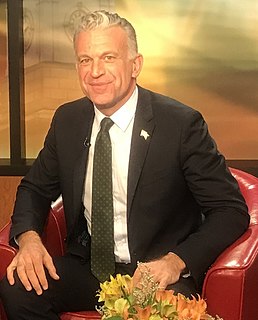A Quote by Robert A. Williams, Jr.
The case of Johnson v. M'Intosh is exactly why Congress can pass legislation as it did with the Rio Tinto land mine deal because Congress took the land from the tribes, ignores their sacred connections to it, their cultural connections and does whatever it wants with it. Congress terminated tribal status for more than 100 tribes. Basically said, you're not a tribe anymore and we're not going to pay attention to the treaties. The Supreme Court has held that when Congress breaches a treaty with an Indian tribe it's not judicially reviewable. It's called a political question.
Quote Topics
Anymore
Attention
Basically
Because
Case
Congress
Connections
Court
Cultural
Deal
Did
Does
Exactly
Going
Held
Indian
Johnson
Land
Legislation
Mine
More
Pass
Pay
Pay Attention
Political
Question
Rio
Sacred
Said
Status
Supreme
Supreme Court
Than
Took
Treaties
Treaty
Tribal
Tribe
Tribes
Wants
Whatever
Why
Related Quotes
I will continue to fight for legislation that forces Congress to read the bills! I will fight for a vote on my bill that calls for a waiting period for each page of legislation. I will continue to object when Congress sticks special interest riders on bills in the dead of night! And if Congress refuses to obey its own rules, if Congress refuses to pass a budget, if Congress refuses to read the bills, then I say: Sweep the place clean. Limit their terms and send them home!
Normally what happens in a new presidency is the president has a big agenda, and Congress is full of people with human weaknesses. And so the president indulges the human weaknesses of members of Congress in order to pass his agenda. This time it's the other way around. Donald Trump does not have much of an agenda. Congress burns with this intense Republican agenda and so does Congress that has to put up with the human weaknesses of the president in order to get a signature on the things it desperately wants to pass.
The commitment to international agreements is embodied, it's found in the U.S. Constitution. Article Six of the U.S. Constitution provides that treaties of the United States are part of the supreme law of the land along with the constitution itself and laws passed by Congress. Well, the US government certainly has not been acting in recent years as if treaties were part of the supreme law of the land.
One was a horrible case called Oliphant v. Suquamish Indian Tribe which denied tribes the right to criminally prosecute non-Indians who commit crimes on their reservations. That decision has had horrible consequences for law enforcement on Indian reservations. But in that opinion Justice William Rehnquist cites language from the 1830s to explain why whites didn't trust tribes to exercise criminal jurisdiction. They were savages.
The Court's decision reflects the philosophy that judges should endure whatever interpretive distortions it takes in order to correct a supposed flaw in the statutory machinery. That philosophy ignores the American people's decision to give Congress '[a]ll legislative Powers' enumerated in the Constitution. They made Congress, not this Court, responsible for both making laws and mending them.
For me, creating the clothes of Givenchy is the way to make my tribe. It's related to religion, too, because it's people trying to find identity - the young generation is looking for tribes. You have the hip-hop tribes, the punk tribes, the rockers, you have the hipsters, the bourgeois ... The fact of the tribe is that it's like a religion. Punk is like a religion, because it's a belief.
Justified or not, the Supreme Court has a kind of sacred status in American life. For whatever reason, Presidents can safely run against Congress, and vice versa, but I think there is an inherent popular aversion to assaults on the court itself. Perhaps it has to do with an instinctive belief that life needs umpires.
The tribe is whatever we believe it is. If we say the tribe is all the Little Ones in the forest, and all the trees, then that is what the tribe is. Even though some of the oldest trees here came from warriors of two different tribes, fallen in battle. We become one tribe because we say we're one tribe." Ender marveled at his mind, this small raman [member of another sentient species]. How few humans were able to grasp this idea, or let it extend beyond the narrow confines of their tribe, their family, their nation.


































